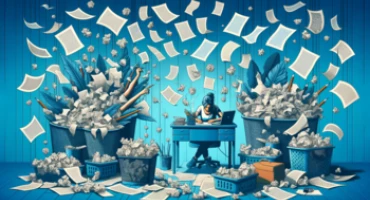The word cliché has been used so much across many texts that it has become banal, no pun intended. Avoiding cliches is just the ticket you need to create more engaging texts. The big question is, what is a cliche?
The most common cliche example is overused phrases. Cliche phrases leave readers stuck in an endless loop of unoriginality. Common clichés are ubiquitous in most literary works, so it is important for readers to distinguish between literary cliches and styled repetitions.
You can find a professional service to write me an essay, which helps you avoid cliché writing and ensures you get the best quality.
This article will teach you how to overcome certain clichés in your creative writing. Various cliché examples are included to help you get a broader understanding.
- After reading the article, you will understand how to stay clear of redundancies when writing.
- The article provides a comprehensive overview of cliches and how to implement them better in your work.
- How to select the right genre and avoid common pitfalls.
- Focus on making your writing interesting; do not overcomplicate it.
What Does Cliche Mean?
In the original context, it is a word or phrase used to express common ideas to the point that it lacks originality. Clichés are often considered trite, predictable, or lacking in creativity because they have been used so frequently that they no longer convey a sense of freshness or uniqueness.
Common cliches take different forms, such as overstressing a point by using fluffy words to express the same meaning. Other examples include redundant phrases, which inflate the text with unnecessary verbosity.
The impact of clichés on writing
An overused phrase gives the reader the impression that the writer lacks depth. Psycholinguists suggest that once a reader identifies a common phrase in a sentence, effort is placed into finding other clichés rather than concentrating on the text.
Research shows that cliches in writing bring about poor reader engagement and wash down the quality of any work of literature. Cliche statements are like cancers in writing, spreading dullness and reducing the richness of ideas.
The Consequences of Using Clichés
Writing can provoke readers’ emotions, but if done wrongly, it can strangle any interest left in a reader.
Many clichés in writing occur because writers seek inspiration from common sources rather than investing effort in finding unique angles.
A typical example of a cliche is “happily ever after,” as it has been stressed to the point that a reader can guess the content of a text after reading just that phrase.
Some of the consequences of redundancies include:
Diminished impact
You might be wondering how clichés in writing affect quality. Repetition introduces emotional barrenness and flatness to creative texts. What is meant to bring out emotions is vivid and unique narration.
A visual example will allow you to understand the impact of cliche examples. If you plant a flower, the idea is to put enough soil on the seed to allow it to sprout. Redundancy is akin to burying your creative seed beneath an excess of soil, preventing the seed from germinating into a vibrant, colorful, textured flower.
Frustrated readers
Variety is the spice of life, and repetition frustrates the human psyche in ways that destroy the reader’s attention. A reader whose attention is not captured turns bored, which can morph into frustration.
Cliched phrases have slowly been integrated into formal writing and other forms of creative writing. Examples of cliches in published works include:
- “Once upon a time.”
- “Actions speak louder than words.”
- “The tip of the iceberg.”
- “Don’t cry over spilled milk.”
- “Bite barking.”
- “Bark the wrong tree.”
The list of cliches is long; however, looking at the cliché examples, you will figure out a pattern. Clichés in writing emerge in common proverbs and phrases overused over time.
Strategies to Avoid Clichés
There are many ways that writers can avoid clichés in writing. Common clichés can be applied, but only in a way that works. However, the best thing for a writer is to learn how to avoid cliches.
You can apply these techniques to your writing projects to make personal statements that resonate with readers.
Cultivating Creativity in Writing
Writing becomes fun when you merge literary devices in a way that best delivers an idea; that is what creativity is all about. Fun fact: creativity becomes easy when you write about something you have experience and passion for.
These ideas allow you to access the depths of your creative well. Feel free to explore alternative angles. Repetitions have no place in a field of fresh visualizations.
Brainstorming Original Ideas
Without properly thinking out an idea, one is bound to settle for repetition to fill in the gaps. It is easy to find clichés in rushed work. Take time to brainstorm because it helps your mind map out different possibilities.
Regardless of your writing, jotting down thoughts and thinking them through can help reduce repetition.
Replacing Clichés with Fresh Language
Ask yourself what is a cliche in writing, identify the redundancies, and replace them with better alternatives. You can draft a cliche list that will guide your choice of words.
When you think of phrases like ‘the best thing since the sliced bread,’ bet on yourself, kid in a candy store, kill two birds with a stone, flog a dead horse, fly by night, etc., look for better alternatives.
Invest some time learning new words and different common words, which will help you avoid them when writing a diagnostic essay, a personal statement, term papers, etc.
Seeking Inspiration from Other Sources
Inspiration is an important element of creativity. Just by reading great writers’ work, you may unlock new ideas that can help you write better.
Explore different writing genres, look at how others use words, and emulate them without plagiarizing or overstressing an idea. Common ideas disappear when you are inspired.
Find writers from and outside your desired genre, and look out for words and phrases worn out due to overuse. You can either modernize those ideas or avoid them completely.
The Role of Genre in Cliché Avoidance
Genre plays an essential role in determining how a writer writes, as a result, it influences the extent to which common phrases are used in a piece of writing.
Usual phrases are common in particular genres; the choice of genre thus becomes important in the avoidance of banalities. Let us consider how a cliché can be avoided through the right choice of genre.
Genres determine what the audience expects
Individual differences have made every reader have certain expectations. When writing a romance novel, some phrases become inevitable to give the reader a sense of familiarity with the text.
In fact, trying so hard to avoid these phrases can disappoint readers. Pick statements that have not been used to the point of being common clichés.
Tone and Balance
Writing a narrative essay story takes a different tone from a play. The mood is one of the qualities of genres. Fiction, for example, demands expressiveness and originality. The genre determines whether common phrases are applied in a balanced manner.
A helpful collection of tone words can assist writers in selecting the right words to match the tone and mood they wish to convey, ensuring the desired emotional impact.
Subverting expectations
In satirical works, styled redundancies can draw the reader’s attention. Styled repetition supports different literary devices if used effectively. In most postmodernist works, banalities are introduced as tools that provoke the reader, and the usage could be in an ironic context that introduces humor. Deliberate use of redundancy is genre-specific, and even in the right genre, use the clichés functionally in necessary circumstances.
Pitfalls While Avoiding Clichés
Why should you avoid clichés in writing? The simple answer is to make your writing original. What happens when you try to overdo it? That is another important question to consider.
Writers fall into traps due to trying too hard to rid their writing of clichés. Let us explore avoiding pitfalls when writing and maintaining the right cliché balance.
Over complication and Forced Originality
Have you heard of Occam’s razor? It is all about finding the simplest way of doing something without overcomplicating. Do not bring in words that spoil the context. Simplicity should be the sharpest arrow in your quiver.
Redundancies are prone to appear in an attempt to make your writing forcefully original. Writers can fall into the trap of replacing clichés with overcomplicated words.
It is better to use trite words than obscure phrases. Every literary work is meant to make meaning to the target audience. If that is impeded, the purpose has been defeated.
Communicate in the simplest way possible. Remember that common words are better than ambiguity.
Striking the Right Balance
Writing is like walking on a tightrope, you must find balance or fall. A good writer knows how to balance avoiding clichés and using them when necessary.
A common phrase is not bad when used judiciously, and it can serve as a touchpoint that boosts readers’ interest. Every reader wants a work that borders on predictability and chaos (unpredictability). The genre you choose determines if your work should be 100% original.
Recognizing When Clichés Can Be Effective
Necessary cliche sentence examples include “Once upon a time,” “In the beginning,” etc. Writers must distinguish a necessary phrase from a common one.
It becomes necessary when trying to convey universal emotions. It is most effective when you want readers to quickly understand the meaning of something complicated.
Know when to use a cliché, how, and where. Do not use the phrase more than once. Limit it to applicable contexts only.
A Path to Authenticity
Redundancy is simply an overused word, phrase, or sentence. Furthermore, it can be a redundant idea that causes the reader to lose interest in a work. A work filled with redundancy loses relevance at first glance. Writers must learn to avoid these redundancies to create more original work.
We cannot say a regular phrase or word is bad, but its presence in texts washes down originality. Avoiding repetitions can make your work more flavorful. However, overdoing it can land you in trouble. What distinguishes a good writer from an average writer is the former’s ability to know when a repeated phrase works and when it doesn’t. A good writer can effectively incorporate the usual words to express general ideas and emotions.





